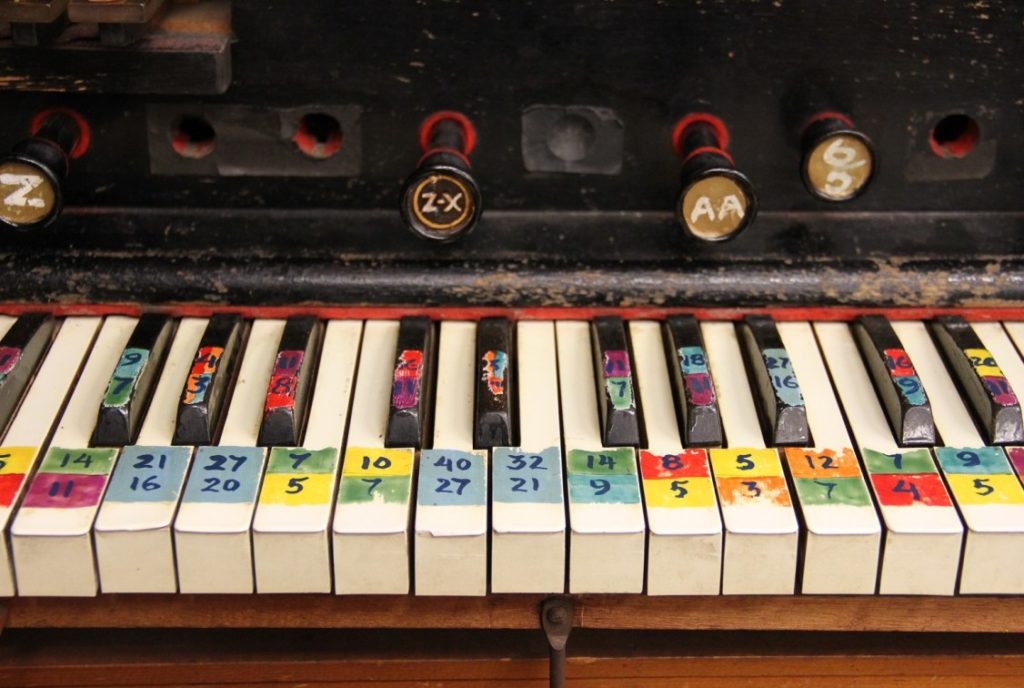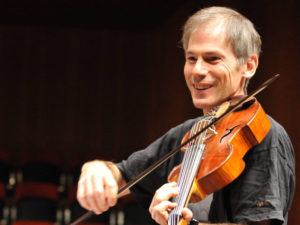
This year’s Harry Partch Festival has kicked off at the University of Washington, where the original Partch instruments have been housed since 2014 under the capable direction of Charles Corey. On hand for the first evening concert on May 12, 2018 was composer-violist and Arditti Quartet alum Garth Knox who premiered his Crystal Paths, a concertino for viola d’amore and six Partch instruments. The work is basically a series of duets between Knox and, in succession, Partch’s Crychord, Bass Marimba, Surrogate Kithara, Chromelodeon and Harmonic Canon. An interesting twist is that once each duet has been underway for a minute or so, the previous Partch instrument joins in to make it a trio, kind of like having a jealous ex-lover butt in wanting attention.

The choice of viola d’amore was an inspired one. This Baroque-era monstrosity with seven primary strings and additional sympathetic strings has a penchant for microtonal inflections and sustained double- and triple- stops, both of which mesh well with the sound world of the Partch instruments. Many of the duets (which follow one another continuously) featured these sustained multiple stops, usually with microtonal slides, while others featured pizzicato playing and (in the case of the duet with the Harmonic Canon) even a “preparation” in the form of paper inserted between the strings. The piece concluded with a gentle tutti built around a diatonic viola melody.
Knox often departs from the standard viola d’amore tuning, which is heavily biased toward D major (which I gather was 17th century Italy’s official Key of Love). Tonight, Knox tuned the lowest string down from the usual A2 to G2 to match the “tonic” of Partch’s microtonal scale.
Knox says “each duo is based on a specific ratio which forms the harmonic and rhythmic basis for the relationship between the instruments”, and his structural metaphor is fluids coalescing into crystals (hence the title). But given that he physically walked around the stage, moving from duet partner to duet partner (his viola being the only portable instrument among six immobile Partch ones), the more obvious metaphor is the Partchian wanderer character ambling from conversation to conversation—a connection to the cantankerous American maverick that works on a literary/symbolic level without trying to conjure up his specific Depression-era hobo persona.
It’s hard to write for the Partch instrumentarium without sounding either like minor league Partch or else generic postmodern chamber music for “weird” instruments. But this piece succeeded a lot better than most. The coupling of a Partch “backup band” with a conventional but archaic Western solo instrument was a compelling one, and the work seemed to strike the right balance between abstraction and referentiality.
The ensemble included Charles Corey on Crychord, Knox’s fellow violist Melia Watras in her secondary career as a Bass Marimba player, Swedish guitarist Stefan Östersjö on Surrogate Kithara, composer and Director of the UW School of Music Richard Karpen on Chromelodeon, and Vietnamese đàn tranh player Nguyễn Thanh Thủy on Harmonic Canon. The concert also featured Partch’s Two Studies on Ancient Greek Scales, and premieres of new works by Watras, Karpen and veteran Partch advocate John Schneider. Still to come over the weekend are several concerts and symposia whose centerpiece is the first complete performance in the Pacific Northwest of Partch’s The Wayward.
